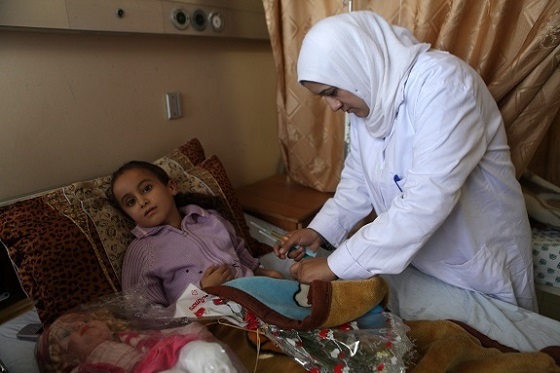
Last week the first cases of COVID-19 were identified in Gaza, and the number of cases continues to grow. The appearance of the virus in Gaza came several weeks after the first cases were identified in the West Bank, where the total number of cases has now risen to over 100 and one woman has died.
Health care systems in both the West Bank and Gaza will be quickly overwhelmed as the virus continues to spread. Development of the Palestinian health system has been stunted by more than 50 years of Israeli occupation and control of Palestinian financial and human resources. More than 60% of the West Bank is under complete Israeli control, and there are no medical providers who can care for those who fall ill. In Gaza, the health system is already critically overburdened, and the whole society is suffering as the result of 13 years of blockade. Action is needed to ensure that this pandemic is contained and that those who become sick can get the care they need.
Take action: Tell Congress to act to prevent a COVID-19 crisis in Gaza
The coronavirus does not discriminate. It has spread through both Israeli and Palestinian communities, impacting hundreds of people and forcing shutdowns and closures. The risks to all people must be a concern. AFSC is working to ensure that the rights of all people to receive medical care without discrimination are respected. However, Gaza, Area C communities in the West Bank, and Palestinian residents of East Jerusalem face specific vulnerabilities that require immediate action to prevent an uncontrolled crisis.
For years, the United Nations and the World Health Organization had warned that Gaza was ripe for the outbreak of a severe epidemic. Gaza is one of the most densely populated places in the world. In the Jabalia Refugee Camp, for example, over 113,000 people live in an area that covers only one-half square mile. Social distancing in such situations is impossible.
The health system in Gaza is not positioned to deal with a massive outbreak of disease. The water and sanitation systems in Gaza are broken as a result of repeated attacks and the military siege. Raw sewage flows into the sea and spills onto land. Over 96% of groundwater is unfit to drink, and many people don’t have regular access to running water. The blockade has limited access to basic medicines and medical supplies, and hospitals are regularly out of over 40% of basic stocks. And as the coronavirus spreads, Gaza has only 56 ventilators total for a population of over two million people.
In the West Bank, the health system will also be quickly overwhelmed as the coronavirus spreads. There are a total of 6,440 hospital beds and only 200 ventilators to serve the more than 3 million residents. Area C communities—the 60% of the West Bank under full Israeli control—face additional vulnerabilities. All movement in these areas is now forbidden and there are no modern medical facilities in these locations. In much of the Jordan Valley and South Hebron, both under complete Israeli control, communities have been denied access to running water and electricity by Israel and live in extreme poverty.
Another group that is particularly at risk are the tens of thousands of Jerusalem residents who live on the West Bank side of the separation wall, cut off from all services in Jerusalem. These Palestinians have the right to care within the Israeli health system, but with all checkpoints between the West Bank and Israel closed, they cannot access hospitals or medical services in Jerusalem or other parts of Israel. Instead, they will be forced to use medical facilities in the West Bank, placing further burden on an overstretched system.
Israel, as the occupying power, is obligated to ensure that Palestinians under its control have access to appropriate medical care, regardless of where they live. But Israel is failing to meet this obligation—and further endangering the lives of millions of people.
AFSC and others have repeatedly called for an end to the Gaza blockade. Today this call is even more urgent, as assistance is critically needed for those who are impacted by COVID-19.
There are other steps Israel should take to address the growing crisis. That includes coordinating with the Palestinian Authority to make testing and care available to all Palestinians facing need; lifting all movement restrictions to ensure people can get treatment without obstacle or delay; and unfreeze the tax revenue that it has withheld from the Palestinian Authority. Additionally, the U.S. should reinstate its funding to the Palestinian Authority and the U.N. Relief and Works Agency for Palestine Refugees (UNRWA) so they can meet needs as they arise.
Without action, the impacts of COVID-19 across the occupied Palestinian territory will be devastating.